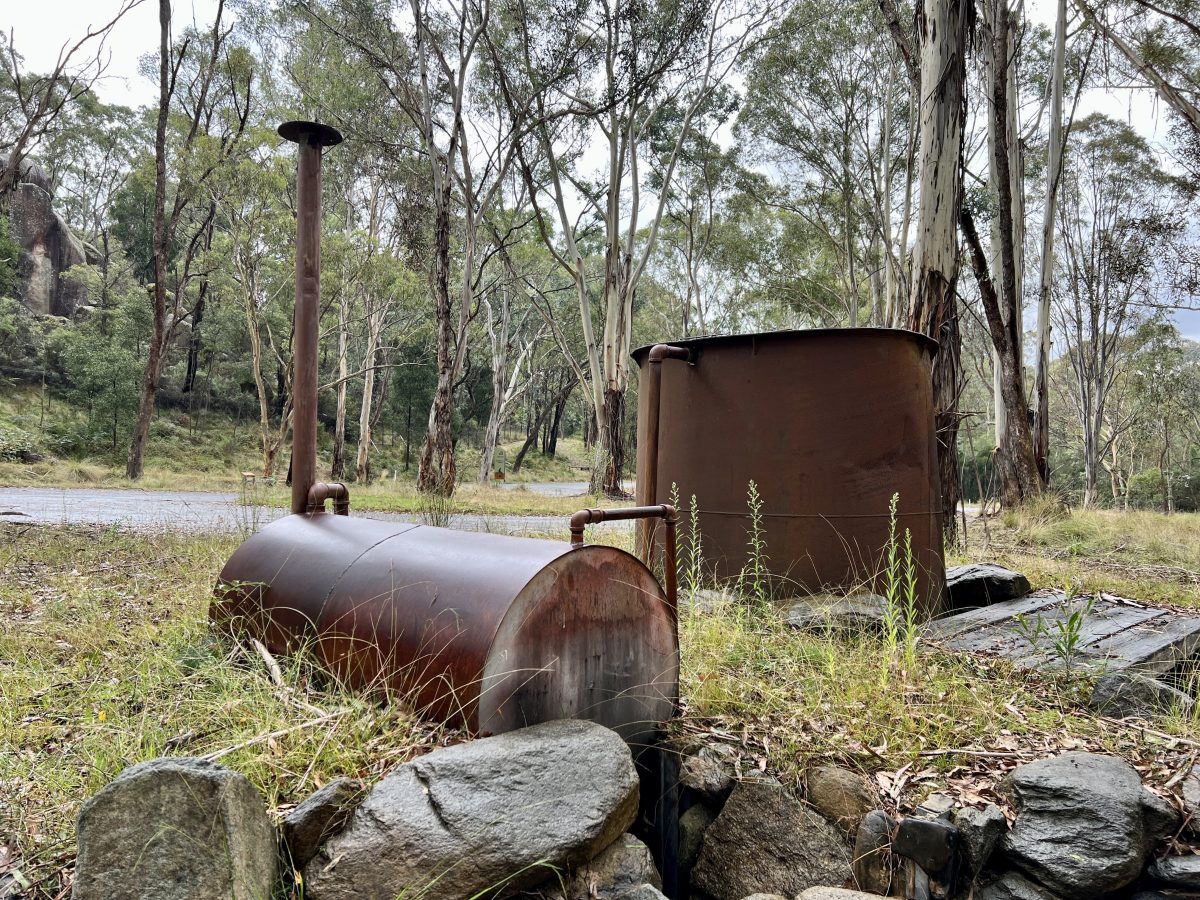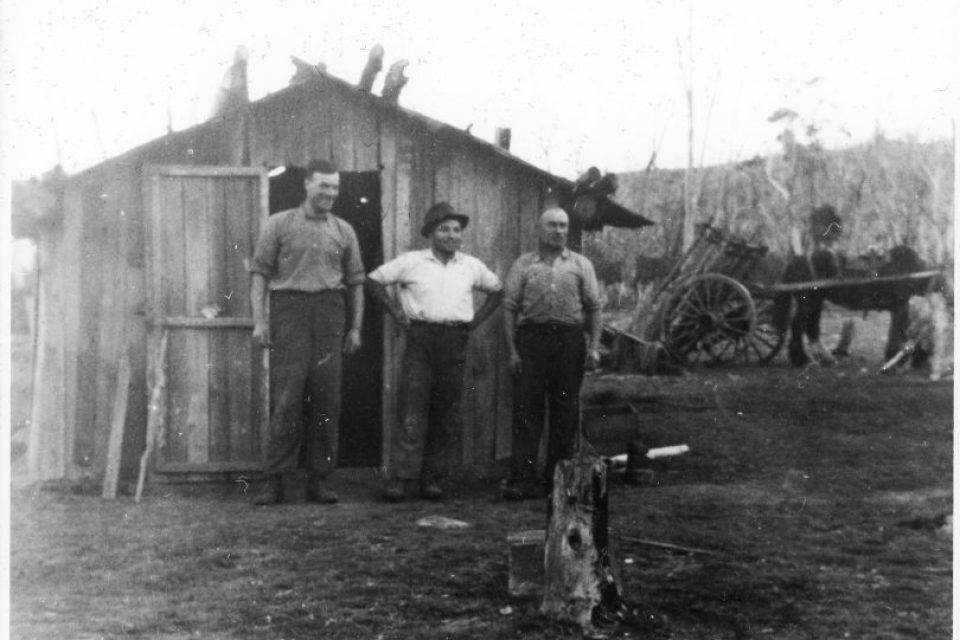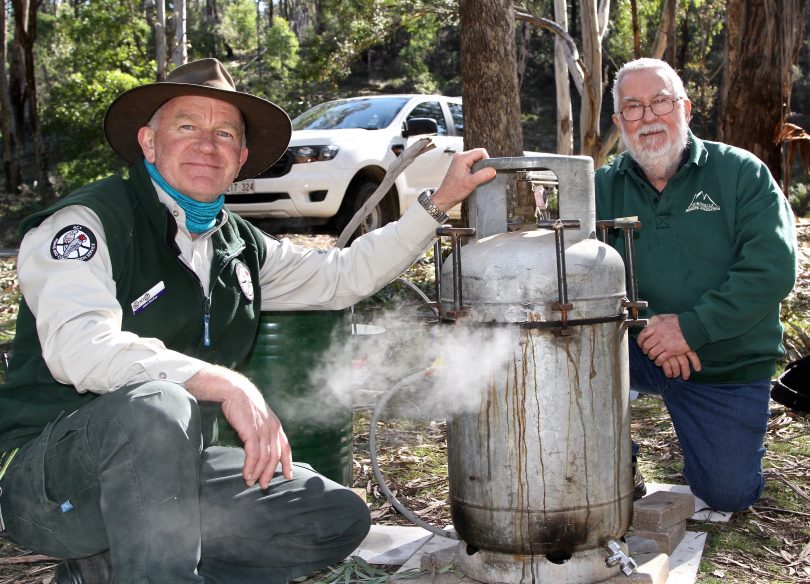
Eucalyptus oil distillery in Tidbinbilla. Photo: James Coleman.
At a time when the average farm hand was earning £5 a week, there was liquid gold to be had west of the Murrumbidgee.
During the early 1940s, a small group of men from the former Czechoslovakia set up two distilleries in the Tidbinbilla Valley, one at Black Flats and another near the Nil Desperandum homestead.
Their business was turning eucalyptus leaves into 44-gallon drums of pure eucalyptus oil, which could then be sold for the equivalent of $2600 a drum. The wage worked out as £14 per week each.
The volunteer-run Tidbinbilla Pioneers Association has faithfully rebuilt the Black Flats distillery and is showing off the site to the public on 19 April as part of the Canberra and Region Heritage Festival.
President Geoff Puleston says Indigenous Australians have been using eucalyptus oil for thousands of years for relief from colds, fevers and body pains, but when World War II rolled around, demand for the naturally occurring disinfectant and cleaning agent (and flea killer) skyrocketed worldwide.
“At the time, south-east Australia was the world leader in eucalyptus oil production,” he says.
“It was mainly for medicinal purposes, but it also had uses in heavy industries such as mining, where it could be used to separate zinc from ore.”
Enter Jan Jandura-Pucek, Steve Lajcin and Martin Tekel. Distilling was common in Europe, turning everything from potatoes to plums into vodka and wine, so the three men were well qualified for the lucrative opportunity Down Under. It’s not like it cost them much, either.
“They were on good terms with the landowners in the area, and basically struck a deal to clear their land in exchange for setting up a distillery,” Geoff says.
“No money changed hands, and there were virtually no overhead costs.”
The distillery hardware took the form of two tanks scavenged from old ships. The larger was jammed full of 400 kg of leaves and the smaller boiler tank was filled with water. A log fire would heat the water to create steam and pass it into the larger tank, which rises through the leaves and condenses on the top. This condensation is collected through a pipe and the precious eucalyptus oil is scooped from the top.
It was a whole week’s work, with the men cutting leaves for five days before distilling on the Saturday (Sunday was a day of rest). Typically, they’d decanter one 44-gallon drum (about 166 litres) every two to three weeks. This would then be trucked to Queanbeyan and put on a train to Melbourne, and most was sent overseas.




Geoff says the men – fondly known as ‘The Czechs’ – were “very much respected” by the other settlers of Tidbinbilla, including the nearby Rock Valley homestead residents.
“One of the landowners about 2 or 3 km up the hill had an issue with fleas. Word got around, and soon, Jan Jandura-Pucek knocked on their door with a container of eucalyptus oil. It fixed their flea problem, so they gave him bread and butter puddings and other food, in the strong spirit of sharing resources that were a hallmark of the Tidbinbilla farming community of the day.”
In fact, in 1949, Jandura-Pucek became the first migrant to receive Australian citizenship.
After the local industry dried up when The Czechs moved on to other ventures and other European immigrant workers left for the lucrative Snowy Mountains Hydro project, all that was left were the empty tanks.
“It had virtually stopped by the late 1940s because by that time the war was over and the price of eucalyptus oil was dropping,” Geoff says.
The government absorbed all the land in the 1960s when Tidbinbilla was designated a nature reserve and set out to remove all signs of European occupation. Many homesteads were bulldozed and campsites buried, but Geoff says the field officer in charge of clearing the Black Flats area rebelled.
“He was a bit of a rogue and decided to hide the tanks up on the hillside and not tell anyone.”
Over the years, the bits and pieces were discovered, but no one bothered to do anything with them until nigh-on 60 years later when the Tidbinbilla Pioneers Association won a $7000 Heritage Grant from the ACT Government to build a replica of the distillery.

The model of a eucalyptus oil distillery in Tidbinbilla. Photo: Michael Weaver.
Despite setbacks from COVID, bushfire and flood, the volunteers hauled the tanks back into position. They used old photos and oral stories – including from one of Jandura-Pucek’s descendants – to reproduce the site.
The Canberra Society of Model and Experimental Engineers (the same group behind the Canberra Miniature Railway) was also tasked with building a small working model.
The real thing might never distil again, but Geoff says it will “help keep these early European stories of our region alive and will let visitors to the reserve learn about this little-known history”.
The Black Flats Eucalyptus Distillery open day will be held on Wednesday, 19 April, from 10 am to 2 pm at the Tidbinbilla Nature Reserve. Visit the Heritage Festival website for more information.












